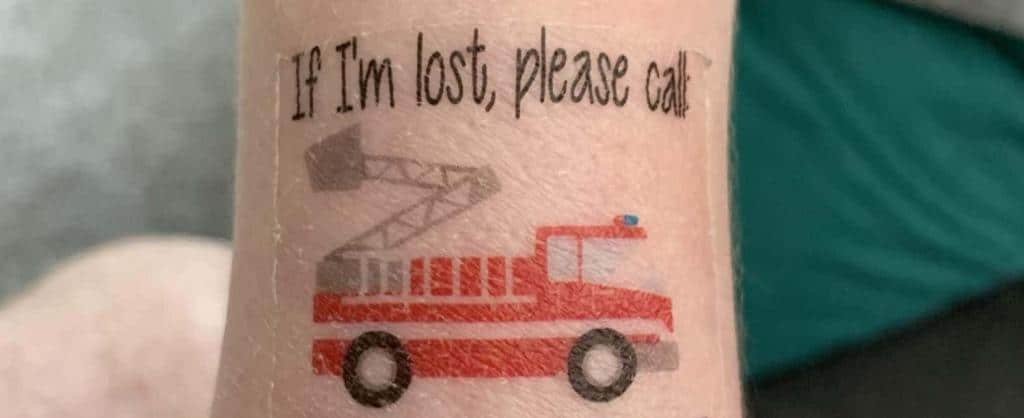Do My Kids Know What To Do If They Are Lost?
Not too long ago, I was at the Children’s Museum with my two kids, alone. My son was in the climbing structure playing, and my daughter took off running. Nothing happened, but it bothered me to leave my son unsupervised while I chased down my daughter. What if he noticed I was gone and decided to wander off trying to find me? What if someone decided to try to take him while I wasn’t watching? Would he know what to do? Would he know not to go with an unfamiliar adult?
When I got home, I did what most of us do, I Googled “how to teach your preschooler what to do if they get lost.” The following is what I took away from the articles.
1. Stay Put
Teach your child to stop what they are doing and stay put until they find you. Tell them the best way to find you is to stay right where they are*.
*Unless it’s dangerous to stay put where they are. Your child can move someplace safe, but then they must stay put until you arrive.
2. Don’t Teach The “Don’t Talk To Strangers” Rule
Don’t teach your kid the “don’t talk to strangers” rule we learned as kids (Samantha Wilson, Kidproof Safety). It may prevent your child from asking for help. Instead, teach them they can’t leave their spot until you find them. No exceptions. Tell your child if the adult insists they should find a different adult to help.
3. Teach Your Child Your Real Name
Make sure your child knows your full name, first and last. It’s way more helpful than “Mom” or “Dad.”
4. Teach Your Child To Shout Your Real Name
Teach your child that as soon as they realize they are lost, they should shout your real name in a clear and loud voice. Teach them that this is a perfect time to use their outdoor voices.
Make sure you shout their name as well. Chances are someone will hear both/either of you and will be more than happy to help.
5. Teach Your Child Your Cell Phone Number
If your child is 3 years old, or older, teach them your cell phone number. Then have them practice dialing it on the phone. Most importantly, teach your child to ask the adult helping them to text you. If you’re like me, you don’t answer calls from numbers you don’t recognize. So texting is the most sure-fire way to ensure I see the message.
6. Label Your Child’s Info Somewhere On Their Person

Make certain personally identifiable information is somewhere on your child. This info can be sewn, duct-taped, or affixed using pre-printed labels. Then teach your child where they can find this information so they can share it with the assisting adult. Or if your child is too young to communicate where the info is, buy them an ID bracelet.
7. Teach Your Child To Look For A Mom With Kids
Teach your child to look for a mom with kids. Moms with kids are more likely to help than your random passerby.
Furthermore, teach your older preschooler how to identify people who have “helping hands.” Have them look for police officers, firefighters, and people who have name tags or badges. Please, reinforce that even if they find a person with “helping hands” they must stay put. It’s too easy for little kids to get confused when there are exceptions to the rules.
8. Create and Practice Your Safety Plan
Make sure to create a safety plan with your child. Then practice this plan, so they know what to do. And, this is super important, make sure you stress to your child that you will find them should they get lost. It’ll also increase the chance they stay calm and follow the rules you have set up for them.
When creating your plan, focus on the positive things your child can do. Focusing on the negative aspects of being lost may accidentally traumatize them.
While practicing with your child, make sure you go over various scenarios such as:
- “What would you do if you couldn’t see me?”
- “What would you do if you don’t see a mom with a child right away after you realize we had been separated?”
- “What would you do if someone said you should go with them to find me?” (verywellfamily.com)
And then make sure to revisit your plan every now and then. Especially if you are going to be in a situation where you may become separated from your child.
BONUS: Know What You Plan To Do
Lastly, make sure you know what to do should you lose your child. Being prepared will help keep you calm and allow you to look for your child more efficiently.
Reference Sites
- https://www.parents.com/toddlers-preschoolers/development/social/child-gets-lost/
- https://www.verywellfamily.com/what-to-teach-a-child-to-do-when-lost-620557
- https://www.familiesforlife.sg/discover-an-article/Pages/5-Things-You-Need-to-Teach-Your-Child-about-Getting-Lost.aspx
- https://www.kindercare.com/content-hub/articles/2017/july/help-im-lost-how-to-teach-your-child-what-to-do-if-hes-lost
Before you go, check out some of our previous posts!

